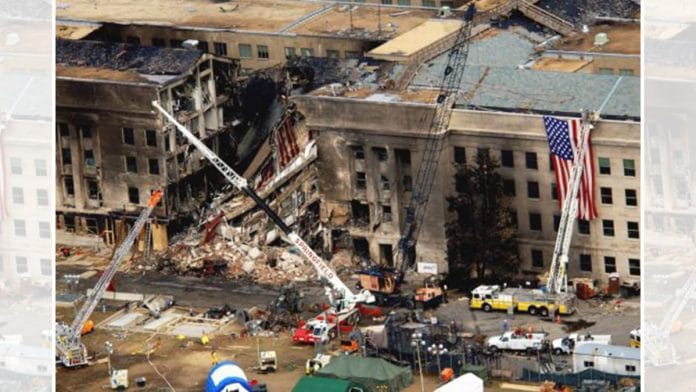New Delhi: A New York district court has opened the door for families of 9/11 victims to sue the Kingdom of Saudi Arabia for the alleged support of its officials and employees to the terrorist plot.
Nearly 23 years after the case registration, District Judge George Daniels delivered the judgment on Thursday. It was made possible by a 2016 law that significantly weakened the legal protections sovereign nations typically enjoy from American lawsuits in cases involving terrorism.
“Today’s landmark decision in the 11 September 2001 case marks an important day for justice,” said lawyers Jodi Westbrook Flowers and Donald A. Migliori, who represented the victims’ families.
First filed in 2002, the case revolved around allegations that the 9/11 terrorists Nawaf Salem al-Hazmi and Khalid al-Midhar, who, among others, hijacked American Airlines Flight 77, received support from individuals with close links to the Kingdom of Saudi Arabia.
“Although [the] Kingdom of Saudi Arabia (KSA) appears to offer seemingly innocent explanations or context, they are either self-contradictory or not strong enough to overcome the inference that the KSA had employed Bayoumi and Thumairy to assist the hijackers,” Migliari and Flowers said.
The 9/11 Commission found no conclusive evidence of the Saudi government supporting the attack. Recent lawsuits and declassified FBI reports, however, present a compelling case that Saudi intelligence agent Omar al-Bayoumi provided logistics support to the terrorists, and Saudi diplomat and cleric Fahad al-Thumairy assisted him in supporting the hijackers.
Findings of any official complicity of Saudi Arabia in the attacks could have serious consequences for the country’s relationship with the United States. The Kingdom has long denied all allegations.
Also Read: There’s a method in Trump’s Pakistan romance. It’s all about Gulf security
The hijackers’ friends
Long pursued by the Central Intelligence Agency (CIA) for their known ties with al-Qaeda, al-Hazmi and al-Midhar were placed under surveillance at the beginning of 2000, when both had been living in Kuala Lumpur. Then, the two travelled to the United States on legitimate passports and visas. For reasons that remain unclear, the Federal Bureau of Investigation (FBI) was not alerted to their arrival until August 2001, an internal investigation later found, as shown in now-declassified documents.
After picking up their luggage from Los Angeles International Airport in early 2000, al-Hazmi and al-Midhar seemed to have disappeared. The two men—well-known to America’s intelligence services—seemingly vanished soon after entering the US.
FBI investigators later came to believe that al-Bayoumi helped the two men through Fahad al-Thumairy, who worked at the Saudi consulate in Los Angeles, US. Besides, al-Thumairy was the imam of the city’s King Fahad Mosque.
In a 2016 interview with the FBI, al-Bayoumi, however, claimed he ran into the two terrorists by chance. The three had lunch at a restaurant, Mediterranean Gourmet, in San Diego. Thereafter, al-Bayoumi helped al-Midhar and al-Hazmi find an accommodation in the city and even made the down payment on their lease. The two men moved into a student accommodation operated by an Indian immigrant, Abdussattar Shaikh.
Later investigation of phone records, as well as eyewitness accounts, would show the FBI that al-Bayoumi remained close to the two hijackers for months after, as the duo attended flight-training school.
Analysis of telephone calls among the trio would show al-Bayoumi and al-Thumari had been in close touch with the cleric Anwar al-Awlaki, reputed to be the spiritual adviser to the hijackers. The calls between them began in December 1999, just a month before the hijackers arrived in San Diego. The calls suggested that al-Awlaki might have been directly supervising the hijackers. In contrast, al-Bayoumi made one call, just after setting up their bank accounts and helping them apply for a credit card.
The precise nature of al-Bayoumi’s life has never been clear. The child of Egyptian immigrants to Saudi Arabia, he worked for a time as an employee at the Ministry of Defence and Aviation. Even as he purports to be attending business studies classes in San Diego, he worked for the Saudi General Authority of Civil Aviation before transferring to the private-sector firm Dallah.
FBI later heard from fellow employees at Dallah that al-Bayoumi was one of nearly 50 “ghost employees” who remained on the payroll but did not come to work.
An incomplete hunt
The hunt for Al-Bayoumi began after 9/11, and counter-terrorism agencies soon tracked him down to Birmingham in the United Kingdom. Like in the United States, he claimed to be studying for a postgraduate degree in business ethics in the UK, but his main activity appeared to be running a student society, with close links to the Embassy of the Kingdom of Saudi Arabia.
Several documents and papers were seized from al-Bayoumi’s Birmingham home, but those remain poorly studied. In 2007, agents reviewing material for destruction found that the al-Bayoumi’s papers contained a hand-drawn diagram of an aircraft descending to strike a spot on the ground—a pattern followed by Flight 77, the jet al-Hazmi and al-Mihdhar hijacked, before the flight hit the Pentagon.
The New York district court’s judgment now opens the way for a long legal battle, which could, in the future, open questions—whether Al-Bayoumi was an asset of the Saudi intelligence services, and, if so, what he told his superiors.
(Edited by Madhurita Goswami)
Also Read: Trump govt considering ban on Muslim Brotherhood—Is the West’s romance with Islamism over?






